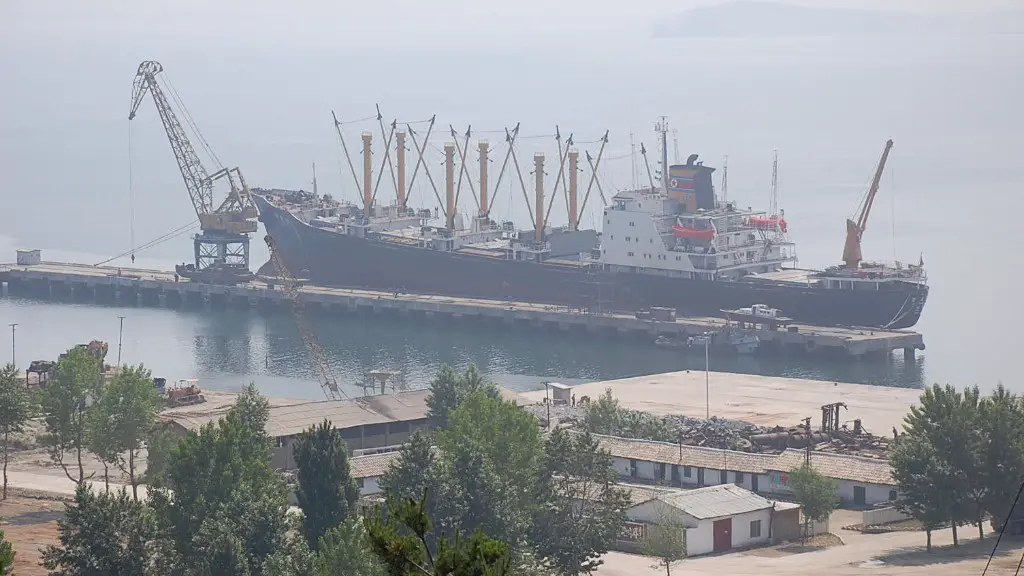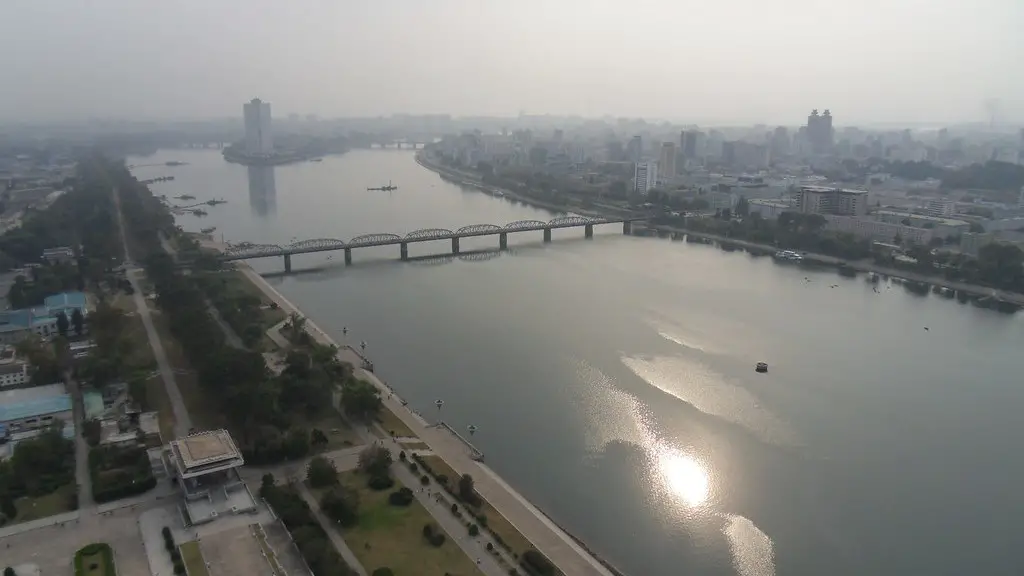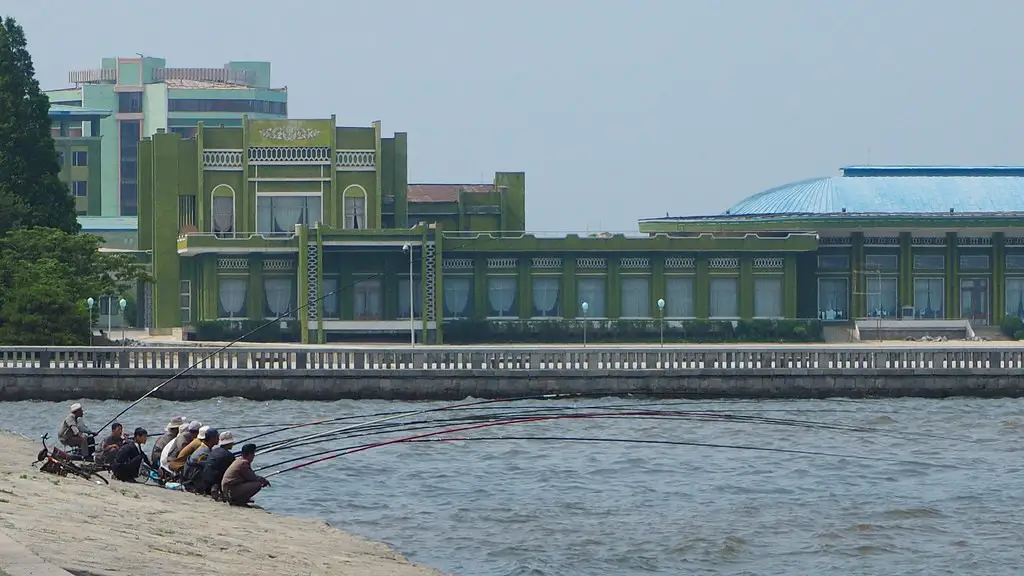Background Information
The debate surrounding the question of whether North Korea has attacked America is ongoing, often hinging upon different interpretations of what ‘attack’ constitutes. It is an issue that has been around for many years and much of the evidence surrounding this debate centres on North Korea’s potential to launch an attack with its nuclear weapons programme. With the current geopolitical tensions between North Korea and the USA, many people are concerned about the possibility of a nuclear attack coming from North Korea.
Even though North Korea has not conducted a physical attack on US soil or in US airspace, it has been involved in a number of cyber attacks. In 2014, North Korea’s new cyber warfare unit was implicated in an attack on Sony Pictures. This attack, known as ‘The Interview’ hack, saw a leak of confidential company documents, including employee emails and scripts of unreleased films. US intelligence agencies subsequently identified North Korea as the source of the attack.
Data and Perspectives from Experts
Properly speaking, North Korea has not attacked the United States of America. North Korean military forces have, of course, engaged in acts of violent aggression against South Korean targets, but at no point have they fired missiles into the United States proper or declared open hostilities with them.
However, there have been many cases of North Korean aggression against US interests abroad. In 2010, North Korean forces allegedly fired a torpedo at a South Korean naval vessel, killing 46 sailors. North Korea has always denied any involvement in the incident, but the United Nations Security Council condemned North Korea for the sinking and put in place additional sanctions against them in response.
Experts on North Korea also point to the fact that North Korea may not have conducted an open attack on the US, but it has been deeply involved in cyber-warfare against them. Cyber-attacks involve clandestine operation that involve infiltrating a computer network and stealing or destroying data.
The cyber-attacks, perpetrated by North Korean agents against US targets, are typically to steal sensitive military or political information, or to disrupt networks or maliciously damage systems. There is evidence that such actions were done by North Korea and were in part, be the motivating factor for tight economic sanctions from the UN Security Council and the US.
Insights and Analysis
It is clear that North Korea has, for many years, posed a threat to the security and stability of the United States and its allies in East Asia and beyond. Consequently, this has led to an increase in tensions between the two countries, with both sides taking aggressive measures to try and protect their own interests and ensuring that the risk of a full-scale open attack from either side is kept to an absolute minimum.
However, North Korea is not without capability to launch a devastatingly coercive attack on the US if and when it wishes, and so it is significant that they have thus far refrained from doing so. The 2014 Sony Pictures attack appears to be the only example of a strategic cyber-attack against the US so far and as such, evidence that North Korea understands the consequences of open physical aggression on such a large scale.
What is clear is that North Korea’s actions towards the US cannot be ignored, and though it is unlikely that an invasion or direct physical attack is on the cards, it is almost certain that smaller but still damaging cyber-attacks will occur in the future.
Nuclear Developments
Arguably, the most worrying development for US security is North Korea’s apparent progress on its nuclear capability. In recent years, North Korea has carried out a number of nuclear tests, indicating a potential nuclear threat. While the US has increased its level of military defense to its allies in the region, it is uncertain whether this will be sufficient to withstand a nuclear attack from North Korea.
In addition to conventional military development, North Korea is known for spending a significant portion of its resources on its nuclear weapons program, which experts believe is more advanced than previously thought. As of this moment, North Korea is yet to construct a long-range missile capable of delivering a nuclear payload, which it would need to launch an attack against US soil. However, the US government has repeatedly stated that it is monitoring North Korean actions and capabilities closely and they have vowed to take action should they see a credible threat from North Korean forces.
UN’s Response
The United Nations has also been involved in thwarting potential North Korean aggression against the US and its allies. In 2006, for example, the UN Security Council imposed sanctions on North Korea regarding its ballistic missile and nuclear programs, which included restricting oil supplies, luxury goods and restricting its arms trade.
Moreover, the UN Security Council has recently adopted a new resolution increasing its sanctions on North Korea. These sanctions are designed to limit the nation’s oil and fuel supplies, halt overseas labour contracts and reign in their weapons trade. Despite this, the UN has yet to move towards a collective military action against North Korea as they believe that diplomatic talks and sanctions will be more effective in managing the security threat.
Media’s Response
The response of the global media to the perceived threat of a North Korean attack has been mixed. Some media outlets have taken a more paranoid tone, presenting the issue of North Korean aggression as an imminent threat that requires decisive action from international governments.
Other commentators have argued that the North Korean nuclear threat has been overstated in the media. Such reports argue that North Korea’s nuclear capabilities are still limited and that the media has been quick to jump to conclusions about North Korea’s capabilities. These reports focus on the fact that North Korea has not yet developed the technology necessary to launch a nuclear attack and allege that the media has sensationalised the situation.
US Leadership and Perception of Risk
The US government has taken a strong stance when it comes to the threat posed by North Korea and the US President has recently reaffirmed the country’s commitment to the South Korean alliance. President Trump has consistently reaffirmed America’s commitment to defend its allies in the Asia-Pacific region, whilst also warning that any attack by North Korea would be met with firm and swift retribution.
The US Administration’s approach to the matter has been to further work with international partners, including South Korea and Japan, to further develop a plan to mitigate any potential risk arising from North Korean aggression. Such an approach recognises that it is not possible to completely eliminate the risk of a North Korean attack, but instead seeks to manage the risk and reduce the likelihood of such an attack.
Political Implications
The issue of North Korean aggression has been a major factor in US foreign policy and political discourse since the election of Donald Trump. Trump has publicly declared that the US should adopt a policy of “maximum pressure” towards the North Korean regime, leading to speculation that the US may launch a preemptive strike against North Korea.
However, such a move would be highly risky due to the potential for all-out warfare, with North Korean forces being armed with nuclear weapons. Consequently, such a move would require the approval of Congress and would also need the consent of US allies, who are also at risk from North Korean aggression.
Many critics have argued that such a move could have severe consequences. Such criticism has come not only from the opposition party in the US, but also from allies in the region who have opposed a more aggressive stance towards the North Korean regime.
Sanctions and Diplomacy
Rather than increasing the risk of open warfare, many commentators have argued that the US should pursue a diplomatic and sanctions-based approach to mitigate the threat posed by North Korea.
Such an approach would involve a combination of economic sanctions and diplomatic talks, as well as increased monitoring of North Korea’s activities. This is seen to be the only way to prevent the risk of open warfare, as the diplomatic channel could be used to reduce tensions between the two sides and the economic sanctions could be used to reduce the North Korean regime’s capability to launch a nuclear attack.
Such an approach is seen by many to be the most effective way to reduce the risk of any aggression from North Korea without resorting to open warfare.
International Efforts
In addition to the efforts of the US, there have also been international efforts to contain the North Korean nuclear threat. In 2017, for example, the United Nations Security Council unanimously imposed further sanctions on North Korea in response to their missile tests.
At the same time, China has also been involved in trying to bring about stability in the region and in reducing the risk of an attack from North Korea. China has been very critical of North Korea’s nuclear ambitions and has supported the United Nations Security Council’s stance on the matter.
Most recently, China has put increased pressure on North Korea to rein in its nuclear activities. It has also put its own economic sanctions in place and has worked to create a dialogue between the two countries.
Peace Negotiations
One of the most promising developments in recent years has been the commencement of peace negotiations between North and South Korea. Such talks have been held in a bid to reduce tensions between the two countries and work towards a peaceful resolution of the North Korean nuclear crisis.
Such talks have seen the two Koreas come together to discuss the prospect of peace, albeit tentatively. It is yet to be seen whether these talks will bear fruit and bring the two countries closer to peace, but the fact that South and North Korea are talking is seen by many to be a positive step.
The peace talks have also been observed by the UN as well as other international organisations, who have commended both countries for engaging in a process that could potentially lead to a peaceful resolution of the North Korean nuclear crisis.


